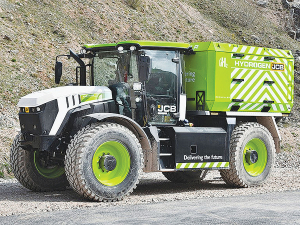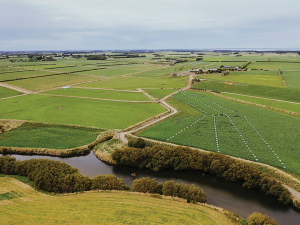When it comes to alternative fuels for industrial and agricultural use, current electric technology means that the size of a battery will run to many tonnes to achieve a day’s meaningful work.
This has led to developers favouring methane power or more recently hydrogen.
Early hydrogen research has centred around using hydrogen cells to produce an electrical current, but more recently JCB has come to the party with its own engine design that uses the hydrogen gas mixed with air.
The company says that using a fuel-air mix and changing the engine design helps to reduce nitrogen oxide (NOx) emissions.
This has been achieved by reducing the temperature and compression ratio of the company’s hydrogen engine, thereby eliminating NOx production completely, so removing the need for any exhaust gas treatment, making for a simpler installation and reducing costs.
The reduction in compression ratio means there is a need for a spark ignition system, making the new engine similar to a petrol engine, which will be something of a culture shock to current operators of offroad vehicles. JCB already has prototype off-road machines running in the real world and is refining its engine, which is based on tried and trusted technology.
While the JCB solution suggests a total rethink of how an internal combustion engine works, German company Bosch suggests that it can bring hydrogen to existing diesel engines with the use of purposed designed injectors.
The company suggests that the biggest obstacle to direct hydrogen injection is a lack of lubrication within the injector that diesel fuel provides in a conventional system, a key consideration given that an injector may operate around a billion times or more over the life of an engine.
The company claims that it has overcome this problem through careful design of the injector and advanced coating technologies, granting the components a life comparable to that of existing items. By doing so, the fundamental structure of the engine, as well as the fuel, air-supply, and exhaust systems already in use on existing engines, can still be used on hydrogen powered variants.
Jan-Oliver Rohrl, executive vice-president at Bosch, responsible for commercial vehicle powertrains, said, “It allows us to maintain large parts of our value. This new technology does not displace Bosch’s interest in the low-pressure systems it already manufactures, and it will continue to offer these products for converting existing ICE engines to hydrogen power.”











